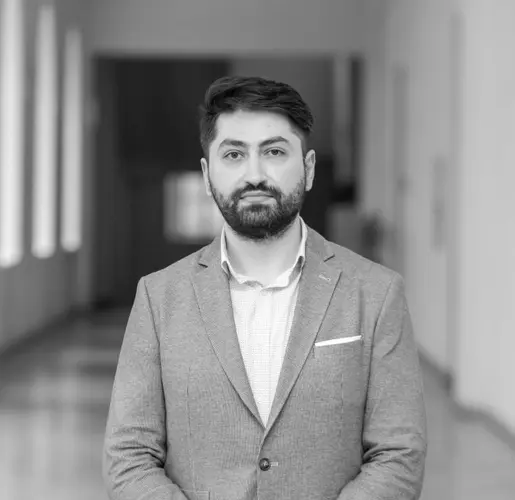GRADUATION INTERVIEW ▼
The Nature of Party Competition in Hybrid Regimes: The Case Study of Georgia
AN INTERVIEW WITH LEVAN KAKHISHVILI

:::::::::::::::::::::::::::::::::::::::::::::::::::::::::::::::::::::::::::::::::::::::::::::::::::::
SHORT PROFILE
Name: Levan Kakhishvili
Field: Political Science
Dissertation: The Nature of Party Competition in Hybrid Regimes: The Case Study of Georgia
:::::::::::::::::::::::::::::::::::::::::::::::::::::::::::::::::::::::::::::::::::::::::::::::::::::
Our doctoral member Levan Kakhishvili has successfully completed his dissertation. In his Graduation Interview, he gives insights into the topic and findings of his dissertation, talks about his time at the BAGSS, and shares the next step in his career.
// What drew you to your dissertation topic and what interests you most about it?
L.K.: After my graduate studies in Georgia and the UK, I spent five years working various research and analytical jobs observing the political development of Georgia. I had a single question in my head: what has to change for Georgian politics to get better, for politicians to serve the interests of voters, for people to get what they want? Eventually, I decided that the key was the way political parties and the party system function – how these actors interact with each other and how they represent the interests of voters. This is why I decided to study party politics so that I could gain a comprehensive understanding of it in Georgia and potentially come up with some ideas of improving what I thought was problematic. So in a nutshell, I love how academic understanding of political parties connects with real world problems, how the topic of my dissertation is relevant to the lives of people in Georgia. I never liked the distinction between theory and practice and still don’t like it at all. Therefore, this was my way of connecting the two worlds. This is why every year during my doctoral studies, based on the data I collected, I would publish a policy paper in Georgia related to party politics elaborating some recommendations. I am very proud that some of the recommendations were taken up and for example in 2020, I was invited to contribute to creating the largest voting advice application in Georgia – Election Compass to help voters navigate the complex landscape of political parties and their policy positions. The tool was used over 38,000 times, which is a huge number for a small country like Georgia. Without my expertise gained at BAGSS during my doctoral research, I wouldn’t be able to be a part of this and bridge the gap between theoretical knowledge and empirical world.
// Can you give us a small sneak peek about the findings of your thesis?
L.K.: My dissertation is about understanding how political parties compete in hybrid regimes by studying the example of Georgia. Usually, we assume that parties either engage in programmatic or clientelistic competition. Either they try to attract votes through policy programmes or through providing excludable benefits to individuals or groups of voters in exchange of their political support. Contrary to prior beliefs, I have found that parties in countries like Georgia, party competition has a stronger than expected programmatic component, which in its turn is very closely intertwined with clientelism. The two phenomena support and channel each other when parties interact with their competitors and their voters. This programmatic component can emerge when there is intra-party factionalism and struggle for power. Such an internal context can lead parties to creating lengthy and detailed policy programmes, which represents a challenge for their competitors, leaving them no other choice but to respond programmatically. As a result, programmatic competition emerges in the party system and parties exchange policy promises to attract voters. These findings go against some literature but are in line with a new body of scholarly work on the connection between programmatic and clientelistic forms of competition. Additionally, by bringing several strands of theoretical works together, I have come up with new conceptual frameworks that help understand party competitive behaviour better.
// What did you enjoy most about your time at the Graduate School?
L.K.: I have enjoyed a lot of things at BAGSS: the opportunities the school creates for its members, the comfort that doctoral fellows have in terms of practical matters such as office space for example, the many different ways of getting feedback on your work through colloquia or individual consultations with your supervisors and peers. However, the best part of BAGSS will always be the people for me. I had the most wonderful office mate with whom I have started some collaborative projects. Other doctoral fellows with whom I have struggled the same demons and been happy sharing each other’s success stories and achievements big or small. The management of the school and the faculty I have found extremely supportive always pushing for improving the BAGSS atmosphere. It is amazing how much these people do to provide an abundance of opportunities with limited resources. I feel lucky I was a part of BAGSS community and gained friends and colleagues that have earned their place in my life.
// What is the next step in your career?
L.K.: I wish to continue my journey of connecting theory and practice in my own way, which is learning and understanding political phenomena theoretically and elaborating theory-informed solutions to real problems. For this purpose, I see an academic career as the best fit. It provides a lifelong chance of gaining, creating, and passing on knowledge. This is why a few months before my graduation, I started a job as a postdoctoral researcher at the European Politics Research Group at ETH Zurich. I will spend a total of three years at ETH Zurich working on the EU enlargement in the framework of a Horizon Europe-funded project InvigoratEU. I hope that meanwhile my dissertation will be published as a book, and I will be able to secure a next step of my career. Wherever I end up, however, I will always miss beers of Bamberg and happily come back to taste them.